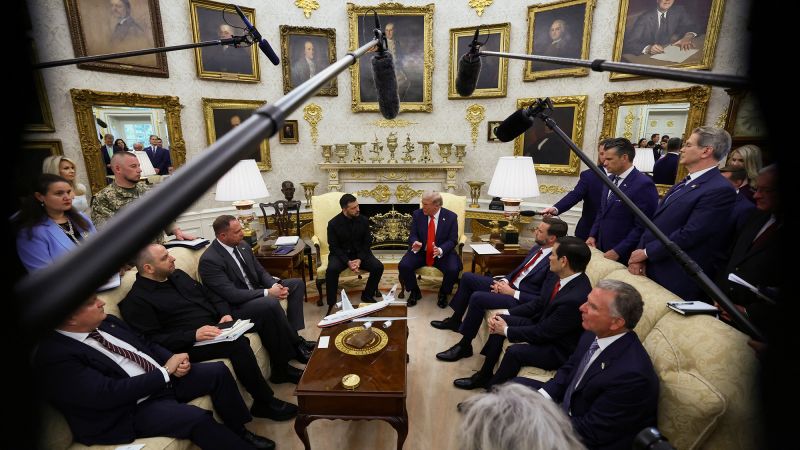In the current political landscape, the role of the press plays a critical part in shaping public perception and holding leaders accountable. Under the Trump administration, it has become evident that the relationship between the White House and the media has undergone substantial changes — a transformation that has raised concerns among seasoned journalists. This was particularly highlighted during a recent event where President Donald Trump and Ukrainian President Volodymyr Zelensky participated in a photo op, with a MAGA online personality leading the question-and-answer session, rather than traditional media representatives.
Veteran White House correspondents expressed their discomfort with how this dynamic has been evolving throughout the year. They noted that the press corps has experienced a significant shift in its composition, which appears to cater to a particular ideology, minimizing independent journalism. The incident served as a stark reminder of the administration’s successful attempts to mold the press dynamics in its favor. Rather than facing challenging questions, Trump was mainly presented with opportunities to deliver his usual talking points, avoiding any significant pushback during the interaction with Zelensky.
A White House correspondent who spoke on condition of anonymity expressed their embarrassment over the situation, emphasizing how many of the questions were framed not to elicit genuine answers, but to incite confrontations or present Trump in a favorable light. Such practices undermine the foundational tenets of journalism, leaving seasoned journalists feeling that even high school students could perform better at the task of holding public officials accountable. The essence of the press’s role has been muted as a result, filtered through a lens of favoritism.
At the heart of these concerns is the composition of the press “pool,” which includes a select group of journalists and camera crews allowed to cover exclusive events, such as Oval Office photo opportunities. Traditionally, the press pool rotation has been managed by the White House Correspondents’ Association, ensuring a fair representation of networks and newspapers. However, this control was shifted to the Trump administration in February, thereby introducing an opportunity for the administration to select representatives from outlets that predominantly align with pro-Trump narratives, further marginalizing established press entities.
During the recent photo op, the pool consisted of several conservative news outlets, including Fox News, Breitbart, and the Washington Examiner, while traditional wire services that once formed the backbone of the press corps were notably absent. Journalist Peter Doocy from Fox asked several questions, but what raised eyebrows was the presence of Brian Glenn, an overtly pro-Trump commentator who works for Real America’s Voice, a MAGA-focused streaming platform. Glenn’s participation in the event was particularly controversial since he was not officially assigned to the pool, exemplifying the administration’s preferential treatment.
The spectacle of this Q&A session further captured the absurdity when Glenn referenced a previous confrontation with Zelensky regarding his attire. Trump used the moment to reinforce partisan storytelling, turning the dialogue into an unsettlingly cozy interaction rather than a rigorous diplomatic discourse. Glenn’s inane compliments to Zelensky about his outfit became a focal point, overshadowing potentially crucial discussions about the ongoing conflict in Ukraine and broader geopolitical concerns.
These peculiar interactions were unnerving to observers, including Johanna Maska, a former member of the Obama White House press office, who highlighted the surreal nature of the proceedings. Her comments on social media remarked on how individuals with known affiliations to Republican politics seemed to dominate a question-and-answer session that dealt with serious global issues such as peace negotiations. In a moment where the stakes could not be higher, the focus on personal quips raised alarms about the media’s commitment to serious journalism.
During the session, Glenn prompted a leading inquiry regarding the American media and its stance on the possibility of a peace deal, effectively shifting the focus towards Trump’s grievances with the press. This prompted Trump to embark on a lengthy diatribe criticizing media coverage and the perceived animosity he faced from certain quarters while showcasing his own narrative on past successes.
The incident underscores a worrying trend in which the administration’s control over media representation compromises the integrity of journalistic oversight. It challenges the very essence of democracy, which relies heavily on a free and independent press to hold power accountable. The current paradigm not only risks the ability of traditional outlets to serve as watchdogs but also diminishes public trust in the media’s role, posing a clear threat to democratic discourse in America.












